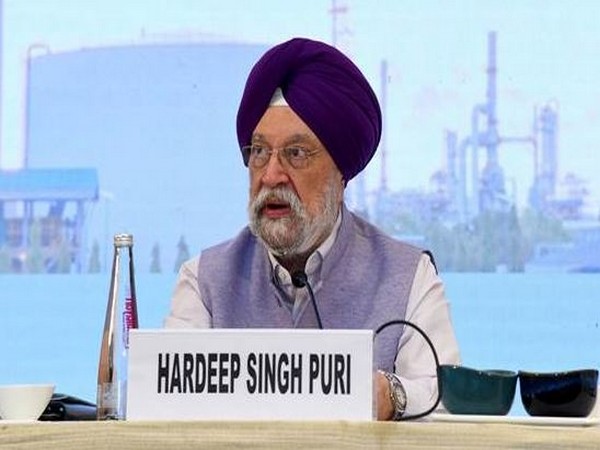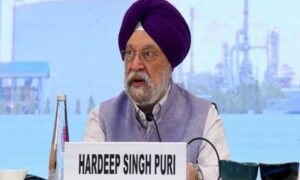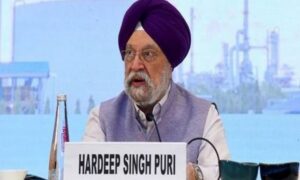India Takes Major Steps in Green Hydrogen; CIAL, IOCL, and GAIL Lead with New Initiatives: Minister Puri

At the 2nd International Conference on Green Hydrogen, Minister Hardeep Singh Puri highlighted India’s commitment to leading in green hydrogen production. The country aims to produce over 1 million metric tons by 2030, with significant progress including a green hydrogen plant at Cochin Airport and various policy incentives. India is poised to meet growing global hydrogen demand.
Shri Hardeep Singh Puri, Minister of Petroleum and Natural Gas, addressed the inaugural session of the 2nd International Conference on Green Hydrogen (ICGH) today, highlighting India’s commitment to becoming a global leader in green hydrogen production and export. The conference, which is taking place from September 11-13, 2024, at Bharat Mandapam, is being organized by the Ministry of New and Renewable Energy, the Office of Principal Scientific Advisor, the Department of Scientific and Industrial Research, the Department of Science and Technology, and the Ministry of Petroleum and Natural Gas.
In his address, Minister Shri Hardeep Singh Puri expressed his strong belief in green hydrogen’s potential as the “fuel of the future” and emphasized India’s capacity to lead in both production and export of green hydrogen and its derivatives. He outlined several initiatives by the Ministry of Petroleum and Natural Gas (MoPNG) to boost hydrogen production in India. Currently, he said that around 54% of the country’s annual hydrogen consumption is used in the petroleum refining sector. The Ministry is ensuring uptake of Green Hydrogen into refineries and City Gas Distribution (CGD) systems through public and private sectors, he said. Minister further informed that the Public Sector Undertakings (PSUs) under MoPNG have set a target to produce over 1 million metric tons (MMT) of green hydrogen by 2030 and are in the process of floating tenders for its procurement on a Build-Own-Operate (BOO) basis, with an initial capacity of ~42 kilo tons per annum (KTPA), expected to rise to 165 KTPA.
Additionally, the Minister said that Cochin International Airport Limited (CIAL) has signed a Memorandum of Understanding (MoU) with Bharat Petroleum Corporation Limited (BPCL) to develop the first Green Hydrogen plant in the aviation sector. Indian Oil Corporation Limited (IOCL) has also handed over a state-of-the-art green hydrogen fuel cell bus to the Indian Navy, and Gas Authority of India Limited (GAIL) has established a plant in Vijaipur, Madhya Pradesh, capable of producing 4.3 tons per day (TPD) of hydrogen using a 10 MW Proton Exchange Membrane (PEM) Electrolyser, he said.
Highlighting the significant progress in the hydrogen sector since the last edition of the International Conference on Green Hydrogen, Shri Puri said that since the last conference, India has secured an electrolyser manufacturing capacity of approximately 3,000 MW, achieved 412,000 tonnes per annum (TPA) in green hydrogen production, and issued tenders for 450,000 TPA of green hydrogen and 739,000 TPA of green ammonia. He emphasized that green hydrogen offers higher efficiency and zero direct CO2 emissions compared to fossil fuels and traditional energy sources.
Outlining India’s strategic vision and potential in green hydrogen production, Shri Hardeep Singh Puri emphasized that India is uniquely positioned to meet the global hydrogen demand, which is expected to reach 200 million tonnes by 2030. With abundant natural resources and a robust infrastructure, India is set to become a key player in the green hydrogen sector. Shri Puri highlighted India’s competitive advantage due to its low-cost solar energy and significant investments in the power grid. The country’s installed solar capacity has surged from 2.6 GW in 2014 to 85.5 GW today, supported by one of the largest synchronous grids in the world capable of managing intermittent renewable energy. This positions India as a leading producer of green hydrogen, ready to cater to both domestic and global markets.
The Minister detailed India’s ambitious Green Hydrogen Policy and National Green Hydrogen Mission. The Green Hydrogen Policy aims for a production target of 5 million tonnes by 2030, supported by incentives such as a 25-year waiver of inter-state transmission charges for projects commissioned before June 2025. The National Green Hydrogen Mission, with an initial investment of Rs. 19,744 crores, is expected to significantly reduce fossil fuel imports by Rs. 1 lakh crores by 2030. This initiative will likely generate over 6 lakh jobs and attract investments totalling more than Rs. 8 lakh crores. Additionally, the Minister noted that several states including Maharashtra, Uttar Pradesh, Madhya Pradesh, Kerala, Odisha, Andhra Pradesh, and Tamil Nadu are developing policies to further incentivize green hydrogen usage, reinforcing India’s commitment to becoming a global leader in green energy.
In his concluding remarks, Shri Hardeep Singh Puri emphasized that while the global green hydrogen value chain is still developing, India must address challenges including green financing, trade routes, and human resource upskilling. He expressed confidence in India’s ability to create a thriving hydrogen hub, benefiting economic development and energy security.

















